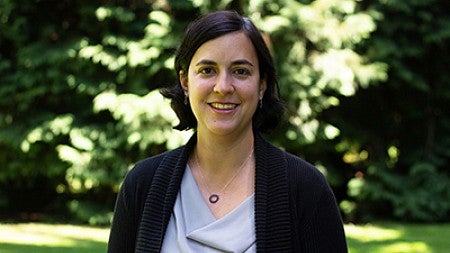
Psychology and Clark Honors College
ndudukov@uoregon.edu | 541-346-7225
Courses: PSY 301 Scientific Thinking in Psychology, PSY 302 Statistical Methods in Psychology, PSY 304 Biopsychology, PSY 433/533 Learning & Memory, PSY 449/549 Cognitive Neuroscience, HC 441H Neuroethics
In my courses you will:
- Practice foundational, transferrable skills.
- Interact during exciting, participatory class meetings.
I was invited into the Teaching Academy because:
- I participated in a Summer Institute on Scientific Teaching.
In what ways are you working to make your teaching inclusive?
I welcome and encourage active participation in my courses, treating all students with respect and understanding. I restate students' questions to establish common ground in the classroom, and I acknowledge different perspectives. I try to incorporate different methods of assessment in my courses and make my teaching materials accessible to all. I also invite students to relate course material to their own experiences and to apply the skills we learn in class to their everyday lives.
What do you do in terms of professional engagement with the teaching and learning culture on campus or nationally?
Since arriving at UO a little over three years ago, I have participated in the Summer Institute on Scientific Teaching and the Science Communication Workshop, as well as several TEP workshops. I am constantly using the skills I gained in these workshops and institutes to improve my courses and enhance my teaching. My participation in the Teaching Academy is one of the ways I demonstrate my commitment to teaching, but the Academy also serves as a quarterly reminder to pause and reflect on my teaching practices. Additionally, my area of expertise is human learning and memory, which has obvious applications for my teaching. I incorporate evidence-based practices into my courses that are based on memory research.
In what ways was your teaching in this course research-led—informed by research on how students learn and inflected by UO's research mission?
I utilize the principle of backward design to create the syllabus for each of my courses. I start with the learning goals for the course and then create activities and assessments that will help students achieve these goals. I typically start each class session by sharing a short list of learning goals for that particular class, allowing students the opportunity to later reflect back on what occurred during class and what they were meant to take away from the class session. During class, I make use of a number of active learning strategies to promote engagement, selecting activities that are designed to help achieve the day’s learning goals. Class sessions often involve exercises (e.g., applications of class concepts), demonstrations, iClicker questions that are used for formative assessment, and discussion. In many of my classes, I collect class data and use that data to illustrate course concepts and to invite students into the research process.
Who or what made you want to be a teacher?
As the daughter of a college professor and a high school teacher, I surprised no one by wanting to be an educator. Frankly, I had no sense of what a different job might look like, but I'm very happy with the path that I chose. I have always loved learning, and the idea that I could keep learning as a career remains very appealing to me. Teaching is my way of making a small difference in the world. I love when students share my enthusiasm for science—when some of my excitement about course topics rubs off on them, that's when I get inspired.
Who or what led you to this discipline?
I have always found human behavior fascinating, which is what first drew me to the field of Psychology. I chose to study human memory because our memories profoundly shape our identities and yet are fallible in many ways. Unlocking the mysteries of memory provides insight into who we are.
